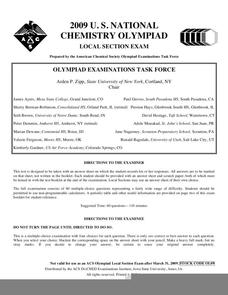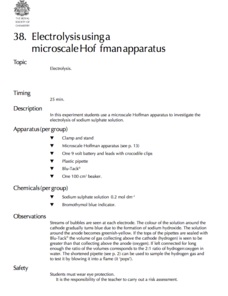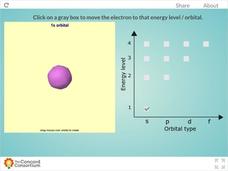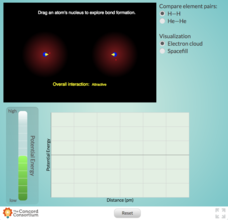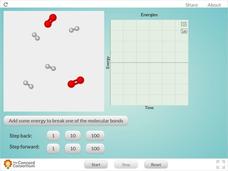Concord Consortium
Polarization
This is one cool resource for teaching about polarity! Chemistry scholars observe electron distribution and molecular shape as they select different non-metals and form bonds. The interactive offers two views, surface charge and electron...
Texas State Energy Conservation Office
Fueling the Future
Future mechanical engineers and automotive technicians read about various solutions to using gasoline in cars. Included are electric, fuel-cell-powered, and hybrid vehicles.
Curated OER
2007 U.S. National Chemistry Olympiad Local Section Exam
Sixty multiple choice questions cover the entire gamut of chemistry concepts. This is the local section of the U.S. National Chemistry Olympiad, where your chemistry candidates take a shot at entering the national competition. They...
Curated OER
2000 U.S. National Chemistry Olympiad Local Section Exam
This 60-question comprehensive exam was designed to determine who would go on to compete in the 2000 US National Chemistry Olympiad. Hopefuls answer multiple choice questions regarding all chemistry topics taught in the first year...
Curated OER
Laboratory: Observing a Candle
In this observation worksheet, scientists observe a burning candle and answer eight post-lab questions. Topics include the phase changes occurring during the observations, the role each part of the candle plays in the chemical reaction,...
Curated OER
Solar Kit Lesson #15 - Solar-Powered Electrolysis of Water and the Hydrogen Economy
An outstanding lesson awaits your physics fledglings! After reading about how hydrogen can act as an energy carrier, they examine the electrolysis of water using solar power. They test the gases produced for flammability and will...
Curated OER
2009 U. S. National Chemistry Olympiad - Local Section Exam
Here is a copy of a past national challenge exam that you can use in your general chemistry course as a unit or semester review. Sixty multiple-choice questions query learners on properties of matter, stoichiometry, reactions, and...
Pingry School
Determination of the Molar Mass of an Unknown Acid
Acids and bases have a love-hate relationship. They balance each other so nicely, but they are complete opposites! Learners use these concepts and titration to calculate the molar mass of an unknown substance. The experiment document...
Pingry School
Replacement of Hydrogen by a Metal
As the most abundant element on the earth, hydrogen requires no replacement. Yet scholars learn to replace hydrogen with a metal to liberate the hydrogen gas. A simple procedure and data table include the necessary information and...
Howard Hughes Medical Institute
Molecular Structure of Fat
Bad fat, good fat, trans fat, food fat—are all fats created equal? Get to the bottom of the types of fat with a well-crafted presentation. The resource covers adipose tissue, lipids, trans fats, and many other substances that fall under...
Royal Society of Chemistry
Electrolysis Using a Microscale Hoffman Apparatus—Microscale Chemistry
Get big results out of a small-scale lab! Young chemists observe the electrolysis of sodium sulfate using a microscale experiment. A colorful indicator solution combined with the production of gas bubbles yields a variety of observations...
Royal Society of Chemistry
pH and pOH
Feeling a little neutral about your pH and pOH teaching strategy? Perk it up with engaging puzzles! Young scientists relate ion concentration to pH and pOH, as well as the dissociation constant for water. The resource is available as an...
Royal Society of Chemistry
pH 2: Activity
Pupils puzzled over pH? Incorporate an interactive resource that teaches through games! Chemistry scholars use reasoning to solve puzzles that focus on determining the pH based upon hydrogen ion concentration.
Royal Society of Chemistry
Organic Formulae 2
Is your chemistry class frustrated by the multitude of representations of organic molecules? Add some challenging puzzles to an otherwise ho-hum organic lesson and let the fun begin! The second of a two-part activity focused on basic...
Royal Society of Chemistry
Electronegativity Values
Finally, an electronegativity resource your class will be strangely drawn to! Skilled scientists manipulate interactive puzzles to gain an understanding of common electronegativity values. The great thing? You can conduct the lesson...
Royal Society of Chemistry
Naming Esters
Do your chemistry scholars know their esters? Introduce the class to the nomenclature and structural formulas of common esters through thought-provoking games. Individuals or pairs of pupils match the name with the formula before using...
Royal Society of Chemistry
Testing for Gases
If most gases are invisible, how do we know so much about them? Pupils practice associating the name, formula, testing method, and outcome for four common gases using an interactive. Users build on the content of their first puzzles to...
Concord Consortium
Chain Reaction Between Hydrogen and Oxygen
Looking for a simple way to teach conservation of energy in chemical reactions? Pupils can observe energy changes as water forms during a chain reaction between oxygen and hydrogen using an interactive. The resource instructs users to...
Concord Consortium
Making Molecules
It's molecule magic! Skillful scholars explore the effects of different atoms on molecular polarization using an intuitive interactive. The resource displays the charge at different locations on the molecule, then adapts as the user...
Concord Consortium
Energy Levels of a Hydrogen Atom
Tired of blowing up countless balloons to illustrate orbital shapes around an atom? Give your lungs a break and use an interactive instead! Learners observe s, p, d, and f orbitals through the first four energy levels using hydrogen as a...
Concord Consortium
Breaking a Molecular Bond
Breaking up is hard, especially with a third part involved! Watch as molecules of hydrogen, oxygen, and nitrogen try to keep it together as a neutral third atom bombards them. Users control the reactive molecules and the velocity of the...
Concord Consortium
Energy of Bond Formation
Show your chemistry class that there's much more to covalent bonding than sharing electrons! Pupils manipulate atoms of hydrogen, oxygen, and carbon to observe the energy of bond formation using a well-rounded interactive. The resource...
Concord Consortium
Non-Bonding
What makes helium so Noble, anyway? Explore the bonding properties of helium versus those of hydrogen using an interactive resource. Science scholars manipulate atoms of each element and observe changes in potential energy as the atoms...
Concord Consortium
Reaction Between Hydrogen and Oxygen Molecules
When molecules of hydrogen and oxygen are combined, how does water form? Science scholars observe changes in kinetic and potential energy during a chemical reaction in an interactive. The resource features easy controls that allow users...








